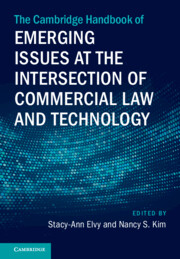Book contents
- The Cambridge Handbook of Emerging Issues at the Intersection of Commercial Law and Technology
- The Cambridge Handbook of Emerging Issues at the Intersection of Commercial Law and Technology
- Copyright page
- Epigraph
- Contents
- Figures
- Tables
- Contributors
- Preface
- Acknowledgments
- Part I Contemporary Technological Developments
- Part II The Implications of Emerging Product Design and Business Models
- Part III Contracting and Dispute Resolution
- 14 Contract and Commercial Law Challenges with AI Products and Services
- 15 How Smart Are Smart Readers? LLMs and the Future of the No-Reading Problem
- 16 Deconstructing Smart Contracts
- 17 Artificial Intelligence and Contract Formation
- 18 Consumer Contracting in the Smartphone Era
- 19 Evolution and Emerging Issues in Consumer Online Dispute Resolution (ODR)
- Index
14 - Contract and Commercial Law Challenges with AI Products and Services
from Part III - Contracting and Dispute Resolution
Published online by Cambridge University Press: 08 February 2025
- The Cambridge Handbook of Emerging Issues at the Intersection of Commercial Law and Technology
- The Cambridge Handbook of Emerging Issues at the Intersection of Commercial Law and Technology
- Copyright page
- Epigraph
- Contents
- Figures
- Tables
- Contributors
- Preface
- Acknowledgments
- Part I Contemporary Technological Developments
- Part II The Implications of Emerging Product Design and Business Models
- Part III Contracting and Dispute Resolution
- 14 Contract and Commercial Law Challenges with AI Products and Services
- 15 How Smart Are Smart Readers? LLMs and the Future of the No-Reading Problem
- 16 Deconstructing Smart Contracts
- 17 Artificial Intelligence and Contract Formation
- 18 Consumer Contracting in the Smartphone Era
- 19 Evolution and Emerging Issues in Consumer Online Dispute Resolution (ODR)
- Index
Summary
The development of AI promises to increase innovation and facilitate advancements in multiple fields. Yet, as companies rush products to market in a race for dominance in this highly competitive field, the potential for widespread social harm is foreseeable. In the absence of legislation, commercial law and tort law provide standards and remedies governing new products; however, companies may alter these default laws by contract. This chapter argues that, until there are industry specific regulations governing AI products and services, adhesive contracts that alter the default rules of tort and commercial law should not be enforceable.
- Type
- Chapter
- Information
- The Cambridge Handbook of Emerging Issues at the Intersection of Commercial Law and Technology , pp. 317 - 335Publisher: Cambridge University PressPrint publication year: 2025

